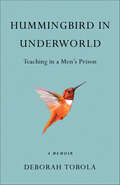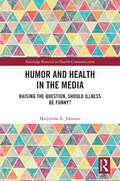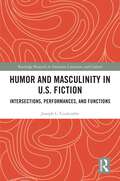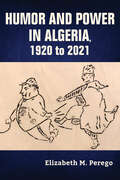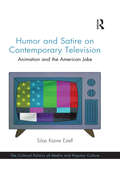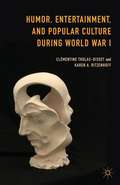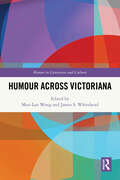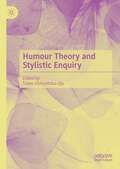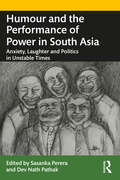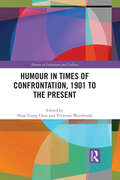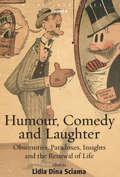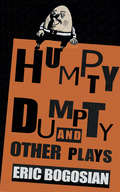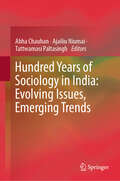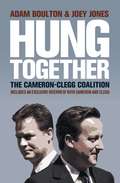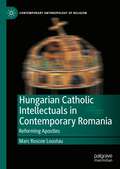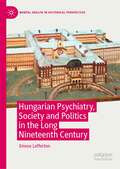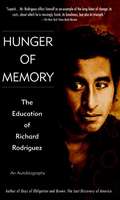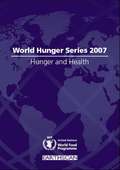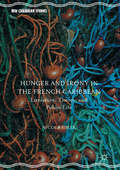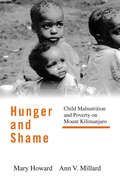- Table View
- List View
Hummingbird in Underworld: Teaching in a Men's Prison, A Memoir
by Deborah TobolaAt the age of forty-five, Deborah Tobola returns to her birthplace, San Luis Obispo, to work in the very prison her father worked in when he was a student at Cal Poly. But she’s not wearing a uniform as he did; she’s there to teach creative writing and manage the prison’s arts program—a dream job. As she creates a theatre program for prisoners, Tobola finds plenty of drama off the stage as well. Inside the razor wire she finds a world frozen in the ’50s, with no contact with the outside except by telephone; officers who think prisoners don’t deserve programs; bureaucrats who want to cut arts funding; and inmates who steal, or worse. But she loves engaging prisoners in the arts and helping them discover their voices: men like Opie, the gentleman robber; Razor, the roughneck who subscribes to The New Yorker; charismatic Green Eyes, who really has blue eyes; Doo Wop, a singer known for the desserts he creates from prison fare. Alternating between tales of creating drama in prison and Tobola’s own story, Hummingbird in Underworld takes readers on an unforgettable literary journey—one that is frank, funny, and fascinating.
Humor and Health in the Media: Raising the Question, Should Illness be Funny? (Routledge Research in Health Communication)
by Malynnda A. JohnsonExamining popular media portrayals of various health topics, this book offers a critical analysis of how those mediated messages can impact, for good or ill, people’s physical and mental health.Looking specifically at how various depictions of health topics have both aided in the normalization of health topics such as neurodiversity and HIV while also critiquing the dissemination of misinformation on these same topics, this book offers insight into the ways in which humorous content can both help and hurt. The author draws on a critical analysis of popular media including shows, social media, and stand-up specials, as well as interviews with those who use humor within health settings, such as Red Nose Docs, comedians who focus on their own health issues.This insightful study will interest scholars and students of health in popular culture as well as health communication, media studies, public health administration, and health policy.
Humor and Masculinity in U.S. Fiction: Intersections, Performances, and Functions (Routledge Research in American Literature and Culture)
by Joseph L. CoulombeHumor and Masculinity in U.S. Fiction offers a pragmatic and theoretically informed model for analyzing how humor and gender intersect in key U.S. texts, bringing much-needed attention to the complex ways that humor can support and/or subvert reductive masculine codes and behaviors. Its argument builds upon three major humor theories – the incongruity theory, superiority theory, and relief theory – to analyze how humor is used to negotiate the shifting constructions of masculinity and manhood in American culture and literature. Focusing on explicit textual references to joking, pranks, and laughter, Humor and Masculinity in U.S. Fiction offers well-supported, original interpretations of works by Mark Twain, Owen Wister, Dorothy Parker, Zora Neale Hurston, Joseph Heller, Philip Roth, and Sherman Alexie. The primary goal of Humor and Masculinity in U.S. Fiction is to understand the multiple ways that humor performs and interrogates masculinity in seminal U.S. texts.
Humor and Power in Algeria, 1920 to 2021 (Public Cultures of the Middle East and North Africa)
by Elizabeth M. PeregoIn times of peace as well as conflict, humor has served Algerians as a tool of both unification and division. Humor has also assisted Algerians of various backgrounds and ideological leanings with engaging critically in power struggles throughout the country's contemporary history. By analyzing comedic discourse in various forms (including plays, jokes, and cartoons), Humor and Power in Algeria, 1920 to 2021 demonstrates the globally informed and creative ways that civilians have made sense of moments of victory and loss through humor. Using oral interviews and media archives in Arabic, French, and Tamazight, Elizabeth M. Perego expands on theoretical debates about humor as a tool of resistance and explores the importance of humor as an instrument of war, peace, and social memory, as well as a source for retracing volatile, contested pasts. Humor and Power in Algeria, 1920 to 2021 reveals how Algerians have harnessed humor to express competing visions for unity in a divided colonial society, to channel and process emotions surrounding a brutal war of decolonization and the forging of a new nation, and to demonstrate resilience in the face of a terrifying civil conflict.
Humor and Satire on Contemporary Television: Animation and the American Joke (The Cultural Politics of Media and Popular Culture)
by Silas Kaine EzellThis book examines contemporary American animated humor, focusing on popular animated television shows in order to explore the ways in which they engage with American culture and history, employing a peculiarly American way of using humor to discuss important cultural issues. With attention to the work of American humorists, such as the Southwest humorists, Mark Twain, Dorothy Parker, and Kurt Vonnegut, and the question of the extent to which modern animated satire shares the qualities of earlier humor, particularly the use of setting, the carnivalesque, collective memory, racial humor, and irony, Humor and Satire on Contemporary Television concentrates on a particular strand of American humor: the use of satire to expose the gap between the American ideal and the American experience. Taking up the notion of ’The Great American Joke’, the author examines the discursive humor of programmes such as The Simpsons, South Park , Family Guy , King of the Hill, Daria, American Dad!, The Boondocks, The PJs and Futurama . A study of how animated television programmes offer a new discourse on a very traditional strain of American humor, this book will appeal to scholars and students of popular culture, television and media studies, American literature and visual studies, and contemporary humor and satire.
Humor, Entertainment, and Popular Culture during World War I
by Karen A. Ritzenhoff Clémentine Tholas-DissetHumor and entertainment were vital to the war effort during World War I. While entertainment provided relief to soldiers in the trenches, it also built up support for the war effort on the home front. This book looks at transnational war culture by examining seemingly light-hearted discourses on the Great War.
Humour Across Victoriana (Humor in Literature and Culture)
by Mou-Lan Wong James S. WhiteheadHumour Across Victoriana investigates the varying facets of ubiquitous humour in Victorian society by focusing on the more marginal and less celebrated aspects of cultural production.Exploring the diverse dimensions of humour in Victorian society, beyond the celebrated works of prominent humourists like Charles Dickens and William Makepeace Thackeray, this volume emphasises the humour found in the peripheral writings of luminaries such as Oscar Wilde, Matthew Arnold, and Thomas Hardy. It also highlights the contributions of female authors, including Catherine Gore, Margaret Oliphant, and Christina Rossetti, who generated humour that transcended patriarchal constraints. The volume provides insights into anecdotal humour across all sectors of Victorian social life, discerns humour under the distorting lens of the increasingly fashionable microscope, and examines how female stage performers navigated oppressive censorship and how authors of Anglo-Indian cookbooks addressed complex racial-political issues. By celebrating a wide spectrum of humour, Humour Across Victoriana strives to contribute towards revising and re-envisaging the concept of humour in the Victorian era and beyond.Elucidating aspects of Victorian humour seldom scrutinised in this historical context, Humour Across Victoriana is an enlightening volume for graduate and advanced undergraduate students, as well as for established scholars of Victorian studies.
Humour Theory and Stylistic Enquiry
by Taiwo Oloruntoba-OjuThis edited book brings together scholarly chapters on linguistic aspects of humour in literary and non-literary domains and contexts in different parts of the world. Previous scholarly engagements and theoretical postulations on humour and the comic provide veritable resources for reexamining the relationship between linguistic elements and comic sensations on the one hand, and the validity of interpretive humour stylistics on the other hand. Renowned Stylistics scholars, such as Michael Toolan, who writes the volume’s foreword against the backdrop of nearly four decades of scholarly engagement with stylistics, and Katie Wales, who in this volume engages with Charles Dickens, one of the most eminent satirists in English literature, as well as many other European and African authors who have worked ceaselessly in the area of humour and language, weigh in on the topic of language and humour in this volume. Together, they provide a variety of interesting perspectives on the topic, deploying different textual sources from different media and from different regions of the world. Part of the book’s offering includes integrative stylistic approaches to humour in African, European and American written texts, examinations of social media and political humour in Nigeria, Cameroon and Zimbabwe, pragmatics and humorous stance-taking, incongruity as comedy in works of fiction, and a unified levels of linguistic analysis approach to the investigation of humour. This book will be of interest to academics and students of Linguistics, Stylistics, Communications and Media Studies, and Humour Studies. Taiwo Oloruntoba-Oju is a Professor in the Department of English at the University of Ilorin in Nigeria
Humour and the Performance of Power in South Asia: Anxiety, Laughter and Politics in Unstable Times
by Sasanka Perera Dev Nath PathakThis book critically examines the role and politics of humour and the performance of power in South Asia. What does humour do and how does it manifest when lived political circumstances experience ruptures or instability? Can humour that emerges in such circumstances be viewed as a specific narrative on the nature of democracy in the region? Drawing upon essays from India, Sri Lanka and Bangladesh, this volume discusses many crucial historical and contemporary themes, including dance-drama performances in northern India; caste and stand-up comedy in India; cartoon narratives of citizens’ anxieties; civic participation through social media memes in Sri Lanka; media, politics and humorous public in Bangladesh; the politics of performance in India; and the influence of humour and satire as political commentaries. The volume explores the impact of humour in South Asian folklore, ritual performances, media and journalism, and online technologies. This topical and interdisciplinary book will be essential for scholars and researchers of cultural studies, political science, sociology and social anthropology, media and communication studies, theatre and performance studies, and South Asian studies.
Humour in British First World War Literature: Taming the Great War
by Emily AndersonThis book explores how humorous depictions of the Great War helped to familiarise, domesticate and tame the conflict. In contrast to the well-known First World War literature that focuses on extraordinary emotional disruption and the extremes of war, this study shows other writers used humour to create a gentle, mild amusement, drawing on familiar, popular genres and forms used before 1914. Emily Anderson argues that this humorous literature helped to transform the war into quotidian experience. Based on little-known primary material uncovered through detailed archival research, the book focuses on works that, while written by celebrated authors, tend not to be placed in the canon of Great War literature. Each chapter examines key examples of literary texts, ranging from short stories and poetry, to theatre and periodicals. In doing so, the book investigates the complex political and social significance of this tame style of humour.
Humour in Times of Confrontation, 1901 to the Present (Humor in Literature and Culture)
by Shun-Liang Chao Vivienne WestbrookHumour in Times of Confrontation: 1901 to the Present examines the various and surprising ways in which humour has been powerfully employed, through a wider range of media than possible at any other time in history, as a response to conflict.With no earlier century undergoing more diverse, more extensive, and more intense conflicts than the period in question, the last twelve decades provide a unique landscape to explore the farthest edge of humour: its darkest side. This book argues that such conflict has not only traumatically shaped the modern psyche but created a fertile ground for humour to grow and evolve with the advent of new representations and technologies. The chapters in this volume focus on international conflicts that have been reported widely through news media but seldom regarded as material for serious humour studies. Each chapter begins by engaging with a particular form of confrontation before providing a case study of how it has contributed to the creation, enjoyment, and/or sharing of humour via different media.This volume is a valuable resource to students and scholars of humour studies, modern cultural and social history, the history of technology, and media studies.
Humour, Comedy and Laughter: Obscenities, Paradoxes, Insights and the Renewal of Life (Social Identities #8)
by Lidia Dina SciamaAnthropological writings on humor are not very numerous or extensive, but they do contain a great deal of insight into the diverse mental and social processes that underlie joking and laughter. On the basis of a wide range of ethnographic and textual materials, the chapters examine the cognitive, social, and moral aspects of humor and its potential to bring about a sense of amity and mutual understanding, even among different and possibly hostile people. Unfortunately, though, cartoons, jokes, and parodies can cause irremediable distress and offence. Nevertheless, contributors' cross-cultural evidence confirms that the positive aspects of humor far outweigh the danger of deepening divisions and fueling hostilities
Humpty Dumpty and Other Plays
by Eric BogosianEric Bogosian is one of our most singular and exhilarating commentators on American life. His award-winning solo performance works have been performed with acclaim all over the world. As the New York Times has pointed out, "Bogosian is a born storyteller with perfect pitch." That is never more evident than in his newest book, which collects his three most recent plays. In Humpty Dumpty, five friends gather for a holiday at a mountain getaway where unforeseen events bring them to the brink of the end of the world; Griller, set in a New Jersey backyard, where a barbecue gathering turns sinister and deadly; and Red Angel, Bogosian's riff on Von Sternberg's The Blue Angel, reset on a college campus in 1990s New England."I want theater to wake me up, not lull me to sleep. My theater is not about fantasy, it's not about seduction. My theater is not an outline for a film. It is not a TV sitcom onstage. I want my theater to be an event. I want it to push limits, bite the hand that feeds it and bang heads. It's about my fears, my ideas, my blind spots, my isolation."--Eric BogosianEric Bogosian is the author of five plays including Talk Radio and subUrbia, as well as three Obie Award-winning solos: Drinking in America; Sex, Drugs, Rock & Roll; Pounding Nails in the Floor with My Forehead and his most recent, Wake Up and Smell the Coffee, which was nominated for a Drama Desk Award. He wrote the screenplay adaptations of his first two plays, receiving the Berlin Film Festival's "Silver Bear" for his work in Talk Radio. Simon and Schuster will publish his second novel in 2005.
Hundred Years of Sociology in India: Evolving Issues, Emerging Trends
by Abha Chauhan Ajailiu Niumai Tattwamasi PaltasinghThis book examines the history of sociology in India. It delves into the origin, growth, and development of Sociology. It traces its trajectory alongside the nation's social, cultural, and intellectual landscape. The chapters examine the diverse strands of sociological thought, the evolving issues, and emerging trends across different regions and domains of Indian society. The chapters cover topics, such as the debates of colonialism and nationalism to the contemporary challenges of liberalization, globalization, and climate change. It engages with pressing issues from digital sociology, environmental movements, agrarian issues, political sociology, Dalit movement, indigenizing sociology, gerontology, and migration to gender studies and sustainable development from both theoretical and empirical perspectives. With its rich discussions, the book provides a key read for academics, students, policymakers as well as researchers in areas such as sociology, anthropology, gender studies, and development study.
Hung Together: The 2010 Election and the Coalition Government
by Adam Boulton Joey JonesHung Together tells the story of an election that made political history, and the first two years of an unprecedented Conservative-Liberal Democrat coalition, as told by the protagonists and as witnessed by two journalists with unrivalled access to events. Adam Boulton and Joey Jones were at the heart of the action during the 2010 general election and are able to draw on detailed interviews with all the key players to build up the most complete and intimate picture of how things unfolded. Hung Together begins by looking at the election campaign and the pivotal events of the weeks running up to polling day - including the televised Leaders Debates (one of which Boulton chaired). More than a year after the election took place, Boulton and Jones re-interview the central political actors and analysts they spoke to during that pivotal time and incisively report on the development and consequences of this coalition government. Cameron's first year as Prime Minister, the government's domestic and foreign policy, the budget, and the balance of the coalition will all be analysed by these two ideally placed political commentators. Whether on the stump, while broadcasting live, or during tense discussions deep in the bowels of Whitehall, the authors witnessed every event themselves or know someone who did. And in Hung Together they unveil a complete picture of what really goes on, a story that is at present shrouded in rumour and secrecy.
Hungarian Catholic Intellectuals in Contemporary Romania: Reforming Apostles (Contemporary Anthropology of Religion)
by Marc Roscoe LoustauSet against the backdrop of the rise of right-wing Christian nationalism in Eastern Europe, this book declares that Catholic theologians ought to be understood and studied as intellectuals: socially and historically situated creators of national cultural traditions. While the Romanian government funds thriving schools for the country’s Hungarian minority, NGOs founded by Transylvanian Hungarians continue to organize volunteers to supplement this formal pedagogy. These volunteers understand themselves to be reviving a national tradition of “serving the people” by educating the region’s rural Hungarian populace. While this book is about the challenges Catholic educators face in teaching villagers, it is just as much about their new effort to call groups of volunteers from across the border in Hungary to teach alongside them. In these encounters, Transylvanian Hungarian educators remake their intellectual tradition, especially ideas about the basis of pedagogical authority, the ethical character of the nation, and the social location of selfhood. When contemporary Catholic intellectuals urge teachers to manifest their national self-consciousness, they carry with them the assumption that selfhood emerges where humans collaborate with God. While Transylvanian Hungarian intellectuals are enmeshed in constant competition, by focusing on contemporary theologians New Magyar Apostles unmasks the struggle over the nature of divine presence that animates this revival of a Christian national tradition of intellectual service.
Hungarian Psychiatry, Society and Politics in the Long Nineteenth Century (Mental Health in Historical Perspective)
by Emese LaffertonThis book provides the first comprehensive study of the history of Hungarian psychiatry between 1850 and 1920, placed in both an Austro-Hungarian and wider European comparative framework. Taking an interdisciplinary approach, the book captures the institutional worlds of the different types of psychiatric institutions intertwined with the intellectual history of mental illness and the micro-historical study of everyday institutional practice. It uncovers the ways in which psychiatrists gradually organised themselves and their profession, defined their field and role, claimed expertise within the medical sciences, lobbied for legal reform and the establishment of psychiatric institutions, fought for university positions, the establishment of departments and specialised psychiatric teaching. Beyond this story of increasing professionalization, this study also explores how psychiatry became invested in social critique. It shows how psychiatry gradually moved beyond its closely defined disciplinary borders and became a public arena, with psychiatrists broadening their focus from individual patients to society at large, whether through mass publications or participation in popular social movements. Finally, the book examines how psychiatry began to influence the concept of mental health during the first decades of the twentieth century, against the rich social and cultural context of fin-de-siècle Budapest and the Austro-Hungarian Dual Monarchy.
Hunger
by Barbara Milbauer Gerald LeinwandThis book studies the millions of Americans trapped in a self-perpetuating state of poverty and malnutrition, whose only hope for the future has become tangled in political red tape.
Hunger In The Balance
by Jennifer ClappFood aid has become a contentious issue in recent decades, with sharp disagreements over genetically modified crops, agricultural subsidies, and ways of guaranteeing food security in the face of successive global food crises. In Hunger in the Balance, Jennifer Clapp provides a timely and comprehensive account of the contemporary politics of food aid, explaining the origins and outcomes of recent clashes between donor nations-and between donors and recipients. She identifies fundamental disputes between donors over "tied" food aid, which requires that food be sourced in the donor country, versus "untied" aid, which provides cash to purchase food closer to the source of hunger. These debates have been especially intense between the major food aid donors, particularly the European Union and the United States. Similarly, the EU's rejection of GMO agricultural imports has raised concerns among recipients about accepting GMO foodstuffs from the United States. For the several hundred million people who at present have little choice but to rely on food aid for their daily survival, Clapp concludes, the consequences of these political differences are profound.
Hunger Of Memory: The Education Of Richard Rodriguez
by Richard RodriguezHunger of Memory is the story of Mexican-American Richard Rodriguez, who begins his schooling in Sacramento, California, knowing just 50 words of English, and concludes his university studies in the stately quiet of the reading room of the British Museum. Here is the poignant journey of a "minority student" who pays the cost of his social assimilation and academic success with a painful alienation - from his past, his parents, his culture - and so describes the high price of "making it" in middle-class America. Provocative in its positions on affirmative action and bilingual education, Hunger of Memory is a powerful political statement, a profound study of the importance of language . . . and the moving, intimate portrait of a boy struggling to become a man. From the Paperback edition. Note: The author uses British punctuation.
Hunger Pains: Life inside Foodbank Britain
by Kayleigh GarthwaiteWINNER OF THE BRITISH ACADEMY PETER TOWNSEND PRIZE 2017 Welcome to Foodbank Britain, where emergency food provision is an increasingly visible and controversial feature of ongoing austerity. We know the statistics, but what does it feel like to be forced to turn to foodbanks for help? What does it take to get emergency food, and what's in the food parcel? Kayleigh Garthwaite conducted hundreds of hours of interviews while working in a Trussell Trust foodbank. She spoke to people like Anna and her 11 year old daughter Daisy who were eating out of date food since Anna left her job due to mental health problems. Glen explained the shame he felt using the foodbank having taken on a zero hours contract. Pregnant Jessica walked two miles to the foodbank because she couldn't afford public transport. This provocative book provides a much needed voice for foodbank users and volunteers in the UK, and a powerful insight into the realities of foodbank use from the inside.
Hunger and Health: World Hunger Series 2007
by United Nations World Food ProgrammeHunger and Health explores the multiple relationships between hunger and poor health, and how they affect the growth of individuals, physiologically and psychologically, constraining the development of nations both socially and economically. Examining the profound effect that hunger has on health, including disease prevention and treatment, it gives special attention to access to quality food and healthcare, in particular for the marginalized and poor. It also identifies critical junctures in the human life cycle when the benefits of reducing hunger and improving poor health have a profound impact. It demonstrates how aligning of hunger and health interventions can offer proven solutions that reach those most in need, and contains compelling evidence which confirms that hunger and poor health are solvable problems today. It encourages those involved in policy, programming and advocacy to take action to address some of the most urgent hunger and health problems. Essential reading for anyone concerned about eliminating hunger. Published with the UN World Food Programme.
Hunger and Irony in the French Caribbean: Literature, Theory, and Public Life (New Caribbean Studies)
by Nicole SimekThrough a series of case studies spanning the bounds of literature, photography, essay, and manifesto, this book examines the ways in which literary texts do theoretical, ethical, and political work. Nicole Simek approaches the relationship between literature, theory, and public life through a specific site, the French Antillean islands of Guadeloupe and Martinique, and focuses on two mutually elucidating terms: hunger and irony. Reading these concepts together helps elucidate irony’s creative potential and limits. If hunger gives irony purchase by anchoring it in particular historical and material conditions, irony also gives a literature and politics of hunger a means for moving beyond a given situation, for pushing through the inertias of history and culture.
Hunger and Poverty in South Africa: The Hidden Faces of Food Insecurity (Routledge Studies in African Development)
by Jacqueline HanomanHunger and Poverty in South Africa: The Hidden Faces of Food Insecurity explores food insecurity as an issue of socioeconomic, political, cultural and environmental inequity and inequality. Based on extensive original research in Free State Province, South Africa, the book explores how people living in poverty make meaning of their food circumstances within the socio-cultural, political and economic contexts of post-apartheid South Africa, how they view the government’s food security policies and programs and their perceived agency to affect change. The personal narratives contained in the book show that food insecurity is shaped by many issues, among which are structural poverty, racism, attempts or non-attempts at reconciliation during and after apartheid, public health issues such as HIV/AIDS, and environmental circumstances. At a time when most discourse around food insecurity focuses on how to provide more food to people facing hunger, this book's multidimensional approach is a valuable contribution to the contemporary dialogue on poverty, food security/insecurity, sustainability and democratic agency both within South Africa and around the world. This book will be of interest to researchers in the areas of food security, multidimensional poverty, democratic agency and sustainable development, both in South Africa and internationally.
Hunger and Shame: Child Malnutrition and Poverty on Mount Kilimanjaro
by Mary Howard Ann V. MillardIn discussing the moral and practical dilemmas posed by the malnourished children in Mount Kilimanjaro, the authors explore the shame associated with child hunger in relation to social organization, colonial history and global economy.
